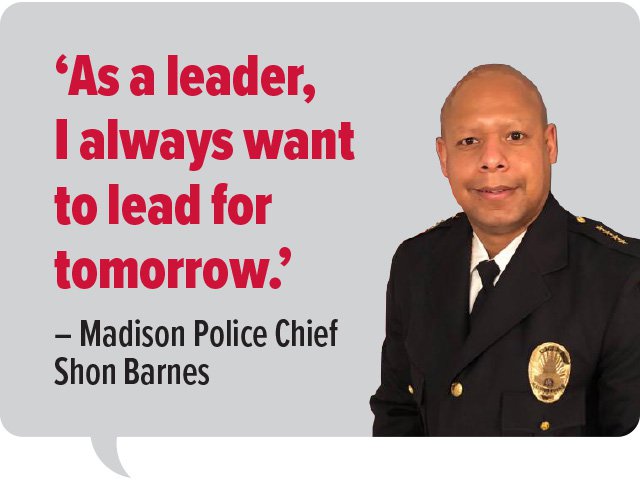The Madison Police Department will soon add a top administrator tasked with making the force more tech savvy. The police reform and innovation director will be an assistant chief-level position and report directly to Chief Shon Barnes.
“When you hear the word police reform, your mind will probably go to George Floyd or protests or this era of reimagining policing,” Barnes tells Isthmus. “But I see it a little bit differently from that, although those things are important…. As a leader, I always want to lead for tomorrow. I always want to lead for best practices. And so we’re trying to catch up with that.”
The Madison Common Council, at its March 29 meeting, approved an initial salary range of $95,000-$115,000 for the civilian position, though Barnes believes the best candidate will have a background in law enforcement. The position was included in the 2022 city budget and council approval was the last step needed before the police department can start the hiring process.
The innovation director, expected to be hired later this year, will be responsible for ensuring the department is using the best software and bringing on the latest crime-fighting tools. Barnes says he recently attended a police conference and saw demonstrations of technology that “blew [his] mind.” For example, drones with a screen that can display real-time video of an officer’s face, so they can communicate with someone in crisis from a distance.
“I saw these things that attach to the front bumpers of police cruisers that will shoot out a GPS device that can attach to a stolen vehicle so that we don’t have to be involved in chases in order to recover vehicles,” says Barnes. “There is software that helps determine how officers spend their time, which will give them greater satisfaction in their jobs because they will be able to prevent crime and/or catch bad guys — instead of just showing up afterwards and taking a report.”
A big part of the police reform and innovation director’s job will be improving data and information management systems, which “need some attention,” says Barnes.
“Currently, if I want data on crime numbers there is a lag time because we have to reconcile reports, we have to make sure that the information is correct,” says Barnes. “We have some work to do on that front.”
Barnes says the Madison Police Department receives more open records requests than any other local police agency in Wisconsin. He’d like to make sure the civilian staff that handle these requests have the best tools to speed up the process. Barnes says the new position will oversee the department’s records division, which could be in charge of managing a lot more video data if Madison equips its officers with body-worn cameras. Alders are set to vote on a body cam pilot program later this month (see opinion column on page 14).
As the years-long debate over body cams indicates, Madison has sometimes been hesitant to invest in new technology for the police. But Barnes says his officers working “smarter, not harder” will allow the police to better serve the public. He’s particularly excited about the police reform and innovation director developing “a new metric to gauge community impact.”
“I want the Madison Police Department to be one of those police departments that you read about in magazines,” Barnes says.


